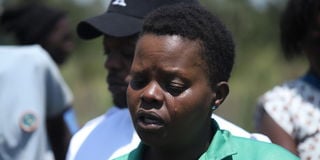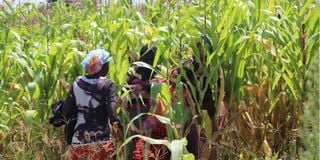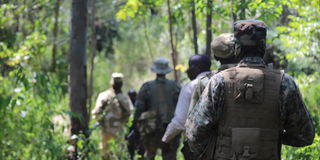Njoro hyenas maul teen, scare women off their farms

Peris Wangui, Mother to 14-year-old Joseph Mwangi, who went missing on July 17 only for some of his remains to be found in a maize farm July 27,2025.
In the quiet farm lands in Lare, Njoro, a deep sense of fear now lingers in every home. What was once a peaceful area has been disrupted by a wave of hyena attacks.
Attacks that have moved from snatching goats and sheep to taking the life of a child.
For Peris Wangui, the nightmare begins on July 17 when her son, Joseph Mwangi, doesn’t return home. At first, she believes he has run off.
But ten days later, a casual labourer harvesting beans stumbles upon torn pieces of clothing in a thicket and brings them to her.
“They were tattered but I knew them. They were my son’s clothes,” she recalls, tears welling up.

14-year-old Joseph Mwangi, who went missing on July 17 and his remains found in a maize farm after he was attacked by hyenas.
Wangui notes the discovery led to a search party rushing to the spot only to find a horrifying scene. She says there were shredded pieces of Joseph’s shorts and his intestines.
“At that moment, it hit me that my child didn’t just go missing. He was attacked. Mauled and eaten by a hyena. I wouldn’t wish this pain on any mother," she says, her voice trembling.
The tragedy has shaken the community to its core, especially mothers who now find themselves constantly watching over their children.
Brigitte Chepkemoi, another resident and mother, says the fear is paralyzing.
“One attack on a child has changed everything. The moment I don’t see one of my children, I panic. I don’t let them play outside our compound anymore. This school holiday won’t be joyful for them like it is for other children,” she notes
Surprisingly the attacks are not only limited to children's safety but women also. Farms, which were once places of productivity and pride, have now become feared spaces.

Women comb through maize fields in search of the remains of 14-year-old Joseph Mwangi on July 27,2025. Mwangi is believed to have been mauled by hyenas.
Susan Mukema, a farmer, says she no longer feels safe walking into her maize fields alone.
“You wake up and see hyena footprints right at your doorstep. Who has the courage to enter a farm alone? I’ve left my potatoes and beans in the field. I would rather they rot than risk my life,” she firmly says.
The women of Lare are not just grieving, they are angry. Angry at what they see as a lack of response from the Kenya Wildlife Service (KWS).
Rachel Wariera is among those demanding more than just token visits.
“KWS officers show up with their vehicles wielding guns, then disappear. What we need is for the hyenas to be found and proper fencing of the park,” she says.

Kenya Wildlife Service (KWS) officers out in a search for the hyenas that have been roaming in Lare, on July 27,2025.
Further lamenting that “They have never compensated us for the livestock we have lost, yet the animals are our only source of income. But if we try to kill a hyena to protect ourselves, they will come for us. So whose life matters more, ours or the hyenas?”
Over the past four years, over 100 livestock have been lost to hyena attacks, according to Sinendet Location Chief, Lewis Kiarahu.
He confirms that the problem is longstanding, but adds that efforts are ongoing to work with KWS and contain the animals.
“I understand the fear. I know these are hard times, but I urge residents to stay calm and protect their children as the authorities step in to handle the situation,” he says appealing to residents.
But for many in Lare, especially mothers like Wangui, calm is a luxury that disappeared the day her son didn’t come home.
“I just want justice,” Wangui says softly.
